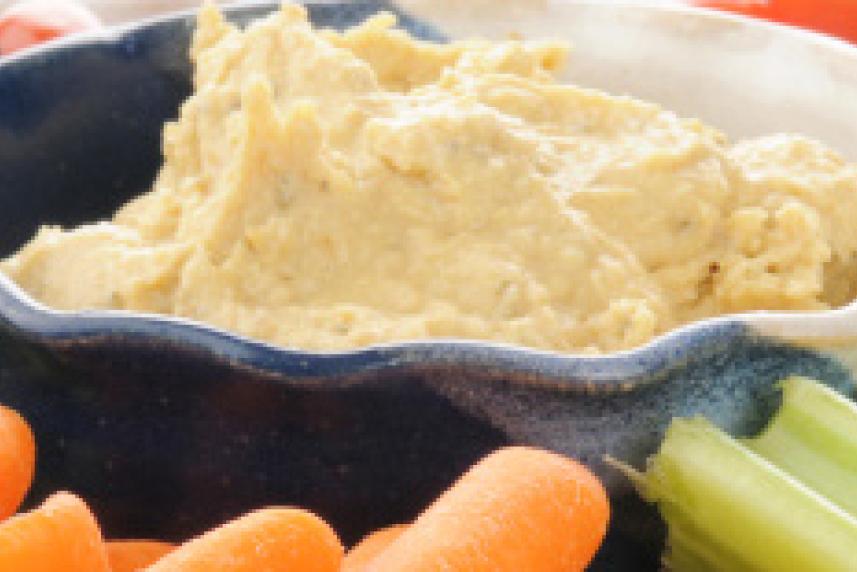Eight healthy foods that derail diets
Are you accidentally overeating?

Hummus is healthy, but not by the tub. (The fat and calories can really add up.) A lot of healthy whole foods can derail your diet if not eaten in appropriate portions. “Many people assume because a food is healthy you can eat a lot of it,” says Amy Shapiro, MS, RD, CDN, founder of Real Nutrition NYC. If you’ve already changed what you’re eating and still are struggling to shed pounds, you might need to look at how much you're eating.
“People frequently tell me that they don't understand why they gain weight when they eat such a healthy diet,” says Sharon Palmer, RD, author of The Plant-Powered Diet. “But when I sit down and discuss what they are eating, it's often the portion size, not the food choice.” Find out if you’re overeating any of these healthy foods.
1. Whole grains
“Whole-grain bread, pasta, or rice are rich in vitamins, minerals, fiber and phytochemicals, but you may only need one serving at a meal if your energy needs aren't that high,” Palmer says. “While whole grains are linked with heart health and more, it's important to practice portion control.” A serving of pasta—1/2 cup—is smaller than you might think. If you’re watching your weight, get out a measuring cup and use it for pasta, oatmeal, cereal, and rice. “Use that as your visual guide,” she says.
2. Fruit
“Fruit is filled with vitamins, minerals, fiber, antioxidants, and carbohydrates, which provide us with energy, fight disease, keep us slim and looking good!” Shapiro says. But fruit still contains calories and sugar: A large apple has about 115 calories and 23 grams of sugar—nearly the equivalent of 6 teaspoons of the white stuff. “Too much sugar when not burned up gets stored as fat,” she says. “So I usually recommend clients stick to 2 to 3 servings of fruit daily.” For most fruits, one piece equals a serving. For berries and fruits like melons or pineapple, think 3/4 cup. Pair it with protein like low-fat cheese or healthy fat like nuts or seeds to slow digestion and keep you feeling satisfied.
3. Avocado
“Avocados can slow digestion, decrease inflammation, and are loaded with heart-healthy fat, antioxidants, vitamin E, folate, and potassium,” Shapiro says. “But a little goes a long way since avocados are 85% fat.” She recommends sticking to 1/4 of an avocado per meal and using it as a substitute for other fats. "Eat it with fiber like on a salad or on whole-grain crackers to help you feel full. Avoid eating guacamole with chips, as their salt content makes you want to consume more.” Serve yourself 3 tablespoons of guacamole on your plate instead of eating it out of a container.
4. Olive oil
“Olive oil is a heart-healthy fat, no doubt about it!” Palmer says. “But at 120 calories per tablespoon, it can really weigh you down.” She says you don’t need to drown your food in it to get the benefits. “In fact those heart health benefits quickly vanish if you gain weight,” she points out. She recommends sticking to 1 tablespoon or less for an entire recipe or using a mister for salads and vegetables.
5. Hummus
“Hummus is a great source of fiber and protein, heart-healthy fats from the olive oil and tahini used in most brands, plus calcium, iron, vitamin B6, and folic acid,” Shapiro says. But the suggested 2-tablespoon serving size has about 50 calories and 2 grams of fat. “Before you know it, you've snacked on half a container and your snack has turned into 200+ calories,” she says. Instead portion out 2 tablespoons on your plate and put the rest away or buy single-serving packets.
6. Nuts
“Nuts are so good for you,” Palmer says. “They are rich in healthy fats, vitamins, minerals, fiber, phytochemicals, and protein. Studies find that if you eat about an ounce a day, you can lower your risk of heart disease.” But an ounce is only about a handful. For almonds that’s about 164 calories and 14 grams of fat. Pour a portion into a cup or ramekin and put the container away.
7. Sorbet
“Sorbet is a healthy choice because it’s usually made from fruit, is dairy-free, and likely provides antioxidants,” Shapiro says. “Portion size is important because sherbet is made with tons of sugar and can cause a sugar rush because there’s no fat to slow its absorption.” Stick to a 1/2-cup serving—or a scoop about the size of a tennis ball—since just that small amount can contain as much as 30 grams of sugar.
8. Chocolate
“Touted as the healthy dessert, chocolate can be loaded with antioxidants,” Shapiro says. “Stick to dark chocolate to get the most bang for your buck and the least added sugar.” Eat no more than 1 ounce per day to keep your waistline in check. Try keeping only individually wrapped pieces around so you don’t end up eating a whole bar.


